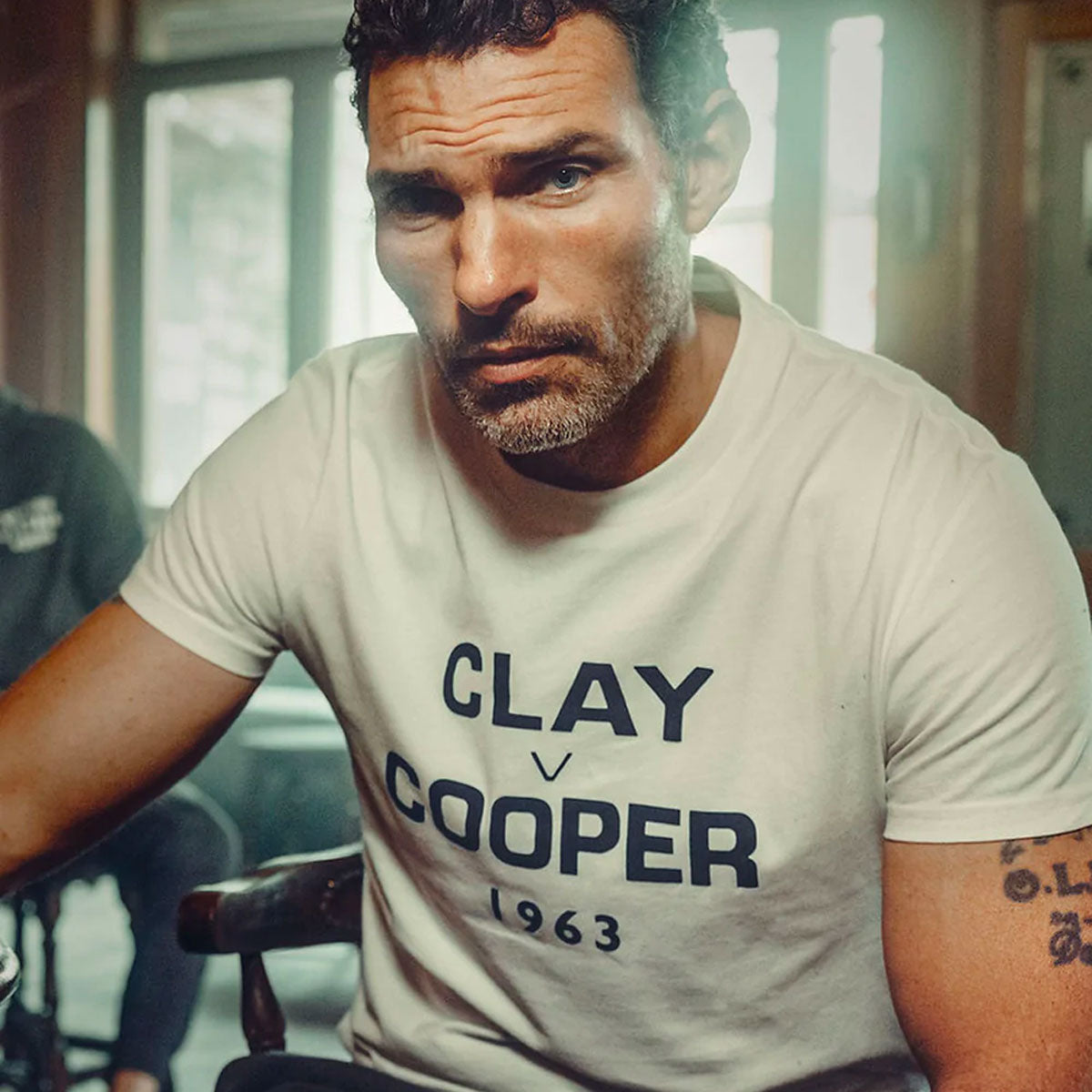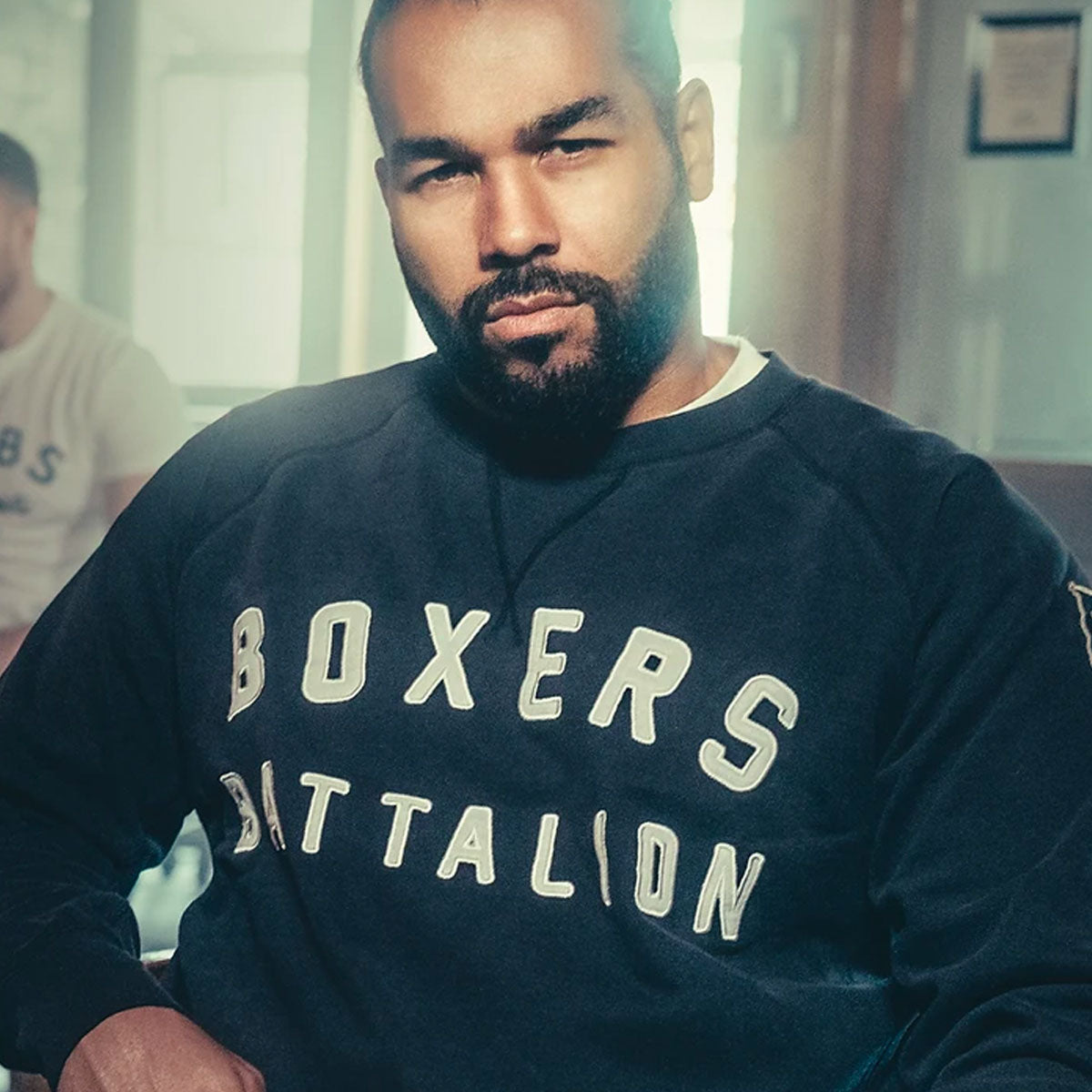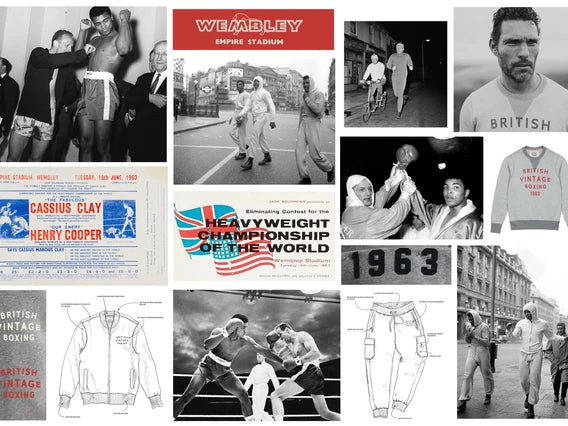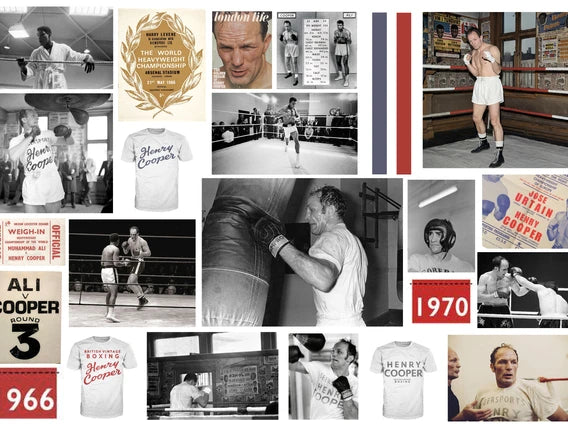Authored by David Payne

Two minutes into the opening round of Henry Cooper's first fight with Muhammad Ali, then Cassius Clay, the proud Englishman snorts hard and draws deeply, he is beyond Clay's reach and permits himself a momentary pause. He knows he has started strongly. His eyes narrow, focussed on the American quarry before him, his nostrils flaring wide as he sucks air from the cool London night. His pale chest heaves.
Thin black leather shoes mold tight to his feet, glistening like wet paint. They slide and sweep, hop and reset to the doctrine of boxing, those strangest of dance steps. Cooper's body is taut, narrow and sinewy, his gloves small and almost cuff less. Thinning hair is cropped short, pointing skyward, exaggerating the urgency of his actions. Battleship grey eyes glare from the shadows of a chiselled brow above. A wedge of protruding bone that juts forward, straining skin and tissue. It is a genetic anomaly that has betrayed him before and would again, in countless wars as yet unfought.
Opposite is Clay, just 21 years old, his beautiful, youthful best, balletic, but not yet the complete fighter of ‘67. He is both startling and startled, retreating and landing. He complains. His face distorts with anger. A faltering mask of denial and self-assurance. Clay remonstrates with the referee, Tommy Little, dressed from head to toe in the neutrality of white. Black cuff links punctuate the ruby dots and dashes that have splattered his sleeves from Clay's leaking nose.
Clay pleads for sanction, for intervention, for sympathy. Cooper is unrepentant, pitiless. He slams Clay again to body and head, sometimes leaping in, sometimes crashing through on the break as Clay lingers in the clinch. Cooper's head bobs, leaves the line, burrows in, tilted, his shoulders perpetually rolling, like a man hiding from a sea breeze behind an upturned collar. His left hand is cocked, busy, his purest weapon, the soon to be famous 'Enry's 'Ammer'.
The British Champion, as is the lore of the time, requests no quarter and offers none in return. Clay is troubled, searching for the respect he is yet to earn, for the gentlemanly etiquette he expected. He is facing the best of Henry Cooper, the fighting man. Bristling. Youth still pumping lavishly through his veins.
Clay had climbed between the ropes, a fake crown resting on his head, in anticipation of victory, of overcoming the man who squeezed his hand, pinched his hips and smiled at the weigh in earlier that day. Cooper was merely the fight before Liston. A formality. A challenge Clay dismissed as "not worth training for."
He'd mistaken Cooper's gentility for weakness. Judged him by his size not his will, by his losses. In doing so, he’d hugely underestimated Cooper’s conviction and failed to appreciate the atmosphere of defiance and the stoicism of the people and time he was shaped by.
In the ring, under the lights, before a baying London crowd of 55,000 of Henry Cooper's own, Cassius Clay, for a few unforgiving minutes, faced the truth of what Cooper was; the bitterest of foes. A flint edged Englishman blind to his disadvantages. A face etched and carved with ruinous lines, earned in the slings and arrows of a dozen yesterdays Clay was yet to live.
The war-time boy with the devil in his left hook. He had survived the Blitz in the streets of South London, been spirited away from his family to Sussex at the height of the bombing and had then, along with two brothers, stepped forward to be the man of the house while their father served in India. That sense of duty, of self-reliance, still burned brightly inside, still called him toward the tumult, toward the bully. A crowd closely affiliated to his pluck, to his defiance, urged him forth. Men of similar humility, who shared Cooper’s history, shared his reality and his struggle.
By the time he met Clay at Wembley, Cooper had endured triumph and disaster with rugged contemporaries like Brian London and Welsh pair Dick Richardson and Joe Erskine. Fights where claret was poured, not sipped, in which heads clashed and rules and noses were bent in arenas cameramen rarely trod.
Clay had speed, size and pedigree, and, as it proved in the 15 years that followed, a special type of resilience too, but on that June evening in 1963, for all his brilliance, he was floored, heavily, and nearly beaten by our 'Enry’s ‘Ammer. It proved fleeting, agonisingly so, as Clay rose at 5, survived, aided by the wisdom of his corner, and then punished the bleeding bull for his impudence in the following round. Cooper was stopped, a veil of red smeared across his face and torso and Little’s white shirt. A wretched cut to his left eye his undoing.
The chance, and the fight, were gone.
Cooper retained a fighter's frame long into retirement, and a fighter’s edge to match. His invective wasn't saved for Ali, or Johansson and Patterson, who he also lost to, but for Hungarian born nemesis Joe Bugner, who beat the retiring Cooper in 1971, just a week after Ali and Frazier met for the first time. A contentious decision, Bugner’s win drew boos and brickbats from Cooper’s devout flock. A quarter point margin, as seen by referee Harry Gibbs, costing him the contentment he craved.
It was a defeat Cooper struggled to reconcile. His bitterness, and the stubbornness of his fighting persona, attached itself like a limpet to the Bugner loss. It was 8 years, and a gallon of sweat and blood spilt, from the night he dropped Cassius Clay and wrote himself into British boxing folklore. He was a tired man of 37 hard years by 1971, and felt he was owed a kinder conclusion. In truth, the result divided opinion.
Henry Cooper the boxer, the only man to win the Lonsdale belt outright three times, gave way to the TV personality, and where once lay sharp, hard edges, so the pleasantries of entertaining eventually softened his face and his frown. He became the first fighter knighted by the Queen, a source of great pride for the Cooper family. An award recognising his charitable efforts as well as his exploits in the ring. He remained fondly welcomed in the boxing parish he’d left behind too, both in Britain and across ‘the pond’.
He passed away in 2011, two days short of his 77th birthday, a year after the death of his twin brother George, who boxed, plastered and completed his National Service alongside his more famous sibling, and just three years on from the loss of his beloved Albina, the girl he met in an Italian restaurant in Soho in 1960.
Henry will never be forgotten. The son of a labourer, who fought his way from a council house in Lambeth to become a Knight of the Realm. A product of a different time and a true post war hero. Synonymous with the nobility of boxing, and remembered for his geniality, for the cuts, for the British, Empire and European titles he won and for the loss to Bugner too.
But most of all, for the night he almost beat Cassius Clay.
A man of a very particular British vintage.
David Payne.

Two minutes into the opening round of Henry Cooper's first fight with Muhammad Ali, then Cassius Clay, the proud Englishman snorts hard and draws deeply, he is beyond Clay's reach and permits himself a momentary pause. He knows he has started strongly. His eyes narrow, focussed on the American quarry before him, his nostrils flaring wide as he sucks air from the cool London night. His pale chest heaves.
Thin black leather shoes mold tight to his feet, glistening like wet paint. They slide and sweep, hop and reset to the doctrine of boxing, those strangest of dance steps. Cooper's body is taut, narrow and sinewy, his gloves small and almost cuff less. Thinning hair is cropped short, pointing skyward, exaggerating the urgency of his actions. Battleship grey eyes glare from the shadows of a chiselled brow above. A wedge of protruding bone that juts forward, straining skin and tissue. It is a genetic anomaly that has betrayed him before and would again, in countless wars as yet unfought.
Opposite is Clay, just 21 years old, his beautiful, youthful best, balletic, but not yet the complete fighter of ‘67. He is both startling and startled, retreating and landing. He complains. His face distorts with anger. A faltering mask of denial and self-assurance. Clay remonstrates with the referee, Tommy Little, dressed from head to toe in the neutrality of white. Black cuff links punctuate the ruby dots and dashes that have splattered his sleeves from Clay's leaking nose.
Clay pleads for sanction, for intervention, for sympathy. Cooper is unrepentant, pitiless. He slams Clay again to body and head, sometimes leaping in, sometimes crashing through on the break as Clay lingers in the clinch. Cooper's head bobs, leaves the line, burrows in, tilted, his shoulders perpetually rolling, like a man hiding from a sea breeze behind an upturned collar. His left hand is cocked, busy, his purest weapon, the soon to be famous 'Enry's 'Ammer'.
The British Champion, as is the lore of the time, requests no quarter and offers none in return. Clay is troubled, searching for the respect he is yet to earn, for the gentlemanly etiquette he expected. He is facing the best of Henry Cooper, the fighting man. Bristling. Youth still pumping lavishly through his veins.
Clay had climbed between the ropes, a fake crown resting on his head, in anticipation of victory, of overcoming the man who squeezed his hand, pinched his hips and smiled at the weigh in earlier that day. Cooper was merely the fight before Liston. A formality. A challenge Clay dismissed as "not worth training for."
He'd mistaken Cooper's gentility for weakness. Judged him by his size not his will, by his losses. In doing so, he’d hugely underestimated Cooper’s conviction and failed to appreciate the atmosphere of defiance and the stoicism of the people and time he was shaped by.
In the ring, under the lights, before a baying London crowd of 55,000 of Henry Cooper's own, Cassius Clay, for a few unforgiving minutes, faced the truth of what Cooper was; the bitterest of foes. A flint edged Englishman blind to his disadvantages. A face etched and carved with ruinous lines, earned in the slings and arrows of a dozen yesterdays Clay was yet to live.
The war-time boy with the devil in his left hook. He had survived the Blitz in the streets of South London, been spirited away from his family to Sussex at the height of the bombing and had then, along with two brothers, stepped forward to be the man of the house while their father served in India. That sense of duty, of self-reliance, still burned brightly inside, still called him toward the tumult, toward the bully. A crowd closely affiliated to his pluck, to his defiance, urged him forth. Men of similar humility, who shared Cooper’s history, shared his reality and his struggle.
By the time he met Clay at Wembley, Cooper had endured triumph and disaster with rugged contemporaries like Brian London and Welsh pair Dick Richardson and Joe Erskine. Fights where claret was poured, not sipped, in which heads clashed and rules and noses were bent in arenas cameramen rarely trod.
Clay had speed, size and pedigree, and, as it proved in the 15 years that followed, a special type of resilience too, but on that June evening in 1963, for all his brilliance, he was floored, heavily, and nearly beaten by our 'Enry’s ‘Ammer. It proved fleeting, agonisingly so, as Clay rose at 5, survived, aided by the wisdom of his corner, and then punished the bleeding bull for his impudence in the following round. Cooper was stopped, a veil of red smeared across his face and torso and Little’s white shirt. A wretched cut to his left eye his undoing.
The chance, and the fight, were gone.
Cooper retained a fighter's frame long into retirement, and a fighter’s edge to match. His invective wasn't saved for Ali, or Johansson and Patterson, who he also lost to, but for Hungarian born nemesis Joe Bugner, who beat the retiring Cooper in 1971, just a week after Ali and Frazier met for the first time. A contentious decision, Bugner’s win drew boos and brickbats from Cooper’s devout flock. A quarter point margin, as seen by referee Harry Gibbs, costing him the contentment he craved.
It was a defeat Cooper struggled to reconcile. His bitterness, and the stubbornness of his fighting persona, attached itself like a limpet to the Bugner loss. It was 8 years, and a gallon of sweat and blood spilt, from the night he dropped Cassius Clay and wrote himself into British boxing folklore. He was a tired man of 37 hard years by 1971, and felt he was owed a kinder conclusion. In truth, the result divided opinion.
Henry Cooper the boxer, the only man to win the Lonsdale belt outright three times, gave way to the TV personality, and where once lay sharp, hard edges, so the pleasantries of entertaining eventually softened his face and his frown. He became the first fighter knighted by the Queen, a source of great pride for the Cooper family. An award recognising his charitable efforts as well as his exploits in the ring. He remained fondly welcomed in the boxing parish he’d left behind too, both in Britain and across ‘the pond’.
He passed away in 2011, two days short of his 77th birthday, a year after the death of his twin brother George, who boxed, plastered and completed his National Service alongside his more famous sibling, and just three years on from the loss of his beloved Albina, the girl he met in an Italian restaurant in Soho in 1960.
Henry will never be forgotten. The son of a labourer, who fought his way from a council house in Lambeth to become a Knight of the Realm. A product of a different time and a true post war hero. Synonymous with the nobility of boxing, and remembered for his geniality, for the cuts, for the British, Empire and European titles he won and for the loss to Bugner too.
But most of all, for the night he almost beat Cassius Clay.
A man of a very particular British vintage.
David Payne.





